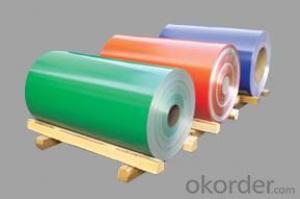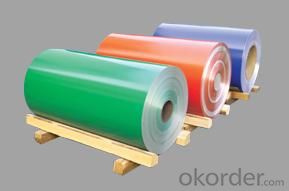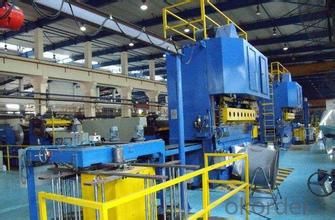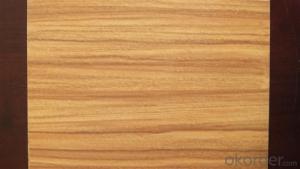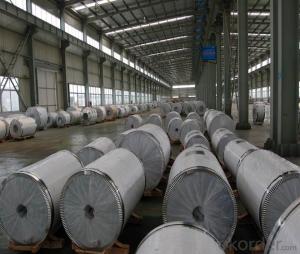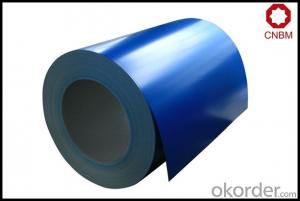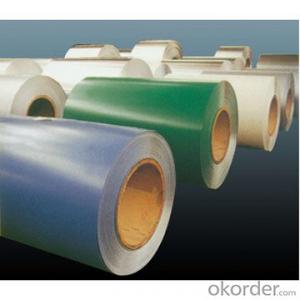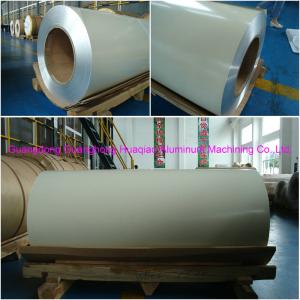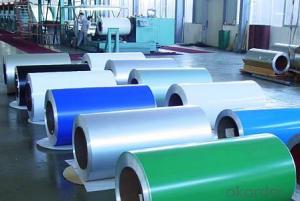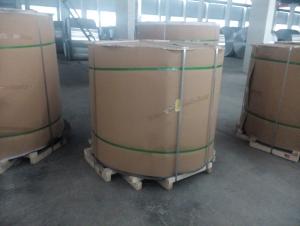Pvc Aluminum Coil Stock Pre Paint Aluminum Rolled
- Loading Port:
- China Main Port
- Payment Terms:
- TT OR LC
- Min Order Qty:
- -
- Supply Capability:
- -
OKorder Service Pledge
OKorder Financial Service
You Might Also Like
Aluminium is a relatively soft,durable, lightweight, ductile and malleablemetalwith appearance ranging from silvery to dull gray, depending on the surfaceroughness. It is nonmagnetic and does not easily ignite. A fresh film ofaluminium serves as a good reflector (approximately 92%) of visible light and an excellent reflector (asmuch as 98%) of medium and far infrared radiation. The yield strengthof pure aluminium is 7–11 MPa, while aluminium alloys have yield strengths ranging from200 MPa to 600 MPa. Aluminium has about one-third the density and stiffness of steel.It is easily machined, cast, drawn and extruded.
Aluminium alloys (or aluminum alloys; see spellingdifferences) are alloysin which aluminium(Al) is the predominant metal. The typical alloying elements are copper, magnesium,manganese,silicon,tin and zinc. There are twoprincipal classifications, namely casting alloys and wrought alloys, both of which are furthersubdivided into the categories heat-treatableand non-heat-treatable. About 85% of aluminium is used for wrought products,for example rolled plate, foils and extrusions.Cast aluminium alloys yield cost-effective products due to the low meltingpoint, although they generally have lower tensile strengthsthan wrought alloys. The most important cast aluminium alloy system is Al–Si,where the high levels of silicon (4.0–13%) contribute to give good castingcharacteristics. Aluminium alloys are widely used in engineering structures andcomponents where light weight or corrosion resistance is required
Features:
1. Excellent quality of products
2. Quick delivery
3. Best service to clients
4. BV,SGS avalible
5. No buckle o waveness
6. Tension leveling
7. Certificate of Origin
8. Form A,E
Packaging Detail: Carton ,Wooden pallet with plastic protection packing,standard seaworthy packing or as your request.
ProductionCapacity:
AnnualProduction capacity of 600,000 tons.
Products areexported to United States, Canada, U.A.E, Brazil, Mexico,Thailand, Vietnam,Nigeria etc, over 100 countries andregions all over the world.
Coveredfactories with full production line
CNBM aluminumproduction base is comprised of 18 aluminumannealers, 10 coil and foilmills, 4 continuous production lines, 2hot rolling production line and 3prepainted lines.
FAQ:
1. What is the form of payment?
Normally 30% TT, L/C
2. Type of quotation?
FOB, CFR, CIF
3. Port of loading?
Shanghai port
4. Delivery time?
30 day after client’s deposit
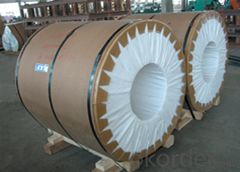
- Q: What is the shelf life of aluminum coils?
- The shelf life of aluminum coils can vary depending on various factors such as storage conditions, handling, and the specific alloy used. Generally, aluminum coils can have a shelf life of several years if stored properly. It is recommended to store them in a dry and clean environment, away from moisture, extreme temperatures, and corrosive substances. Additionally, handling should be done with care to prevent any damage or contamination that may reduce the shelf life. Regular inspection and maintenance are also important to ensure the integrity and longevity of aluminum coils. Ultimately, consulting the manufacturer's guidelines or contacting a professional in the industry can provide more accurate information on the specific shelf life of aluminum coils.
- Q: How do aluminum coils contribute to energy savings in buildings?
- Aluminum coils play a vital role in HVAC systems for buildings, helping to save energy. To start, aluminum coils are highly effective at transferring heat. HVAC systems use these coils to facilitate the exchange of heat between indoor and outdoor environments. Aluminum's thermal conductivity allows for fast and efficient heat transfer, resulting in less energy needed to heat or cool a space. This means that HVAC systems equipped with aluminum coils can achieve the desired indoor temperature more efficiently, leading to energy savings. Furthermore, aluminum coils are lightweight and have excellent corrosion resistance. This property ensures the longevity and durability of the HVAC system, reducing the need for frequent replacements. By lasting longer, the energy and resources used in manufacturing new coils are saved, resulting in reduced energy consumption and environmental impact. Moreover, aluminum coils are highly recyclable. When an HVAC system reaches the end of its life cycle, the aluminum coils can be easily recycled and repurposed. Recycling aluminum requires significantly less energy compared to producing new aluminum from raw materials. By promoting recycling, energy is conserved, and greenhouse gas emissions are reduced. Additionally, aluminum's reflective properties contribute to energy savings in buildings. When used in HVAC systems, aluminum coils can reflect and deflect sunlight, reducing the amount of heat absorbed by the building. This reduces the workload on the HVAC system, resulting in lower energy consumption and increased energy efficiency. In conclusion, the use of aluminum coils in HVAC systems brings about energy savings in buildings due to their high thermal conductivity, lightweight and durable nature, recyclability, and reflective properties. By adopting aluminum coils, buildings can achieve optimal temperature control with reduced energy consumption, leading to significant energy savings and a more sustainable environment.
- Q: How do aluminum coils contribute to energy-efficient lighting?
- The energy efficiency of lighting systems is greatly enhanced by aluminum coils. The exceptional thermal conductivity of aluminum coils is the main advantage when used in lighting applications. Due to its high thermal conductivity, aluminum can effectively transfer heat away from the light source and disperse it into the surroundings. This property prevents lighting fixtures from overheating and ensures the longevity and efficiency of the entire system. Furthermore, aluminum coils are lightweight and have a high strength-to-weight ratio, making them perfect for creating compact and durable lighting fixtures. By utilizing aluminum coils, manufacturers can design and produce lighting products that are lighter and more efficient, thereby reducing overall energy consumption. Additionally, aluminum coils have a high reflectivity, allowing them to efficiently distribute and reflect light. This characteristic results in better light output and ensures that a larger portion of the emitted light is effectively utilized, thereby reducing energy waste. Moreover, aluminum is a highly recyclable material that can be reused and repurposed multiple times without losing its qualities. This recyclability contributes to the overall sustainability of energy-efficient lighting systems, reducing the environmental impact associated with their production and disposal. To sum up, aluminum coils contribute to energy-efficient lighting by effectively dissipating heat, reducing energy consumption through lightweight designs, optimizing light distribution, and promoting sustainability through recyclability.
- Q: What is the reason for the grooves that go around the circumference of a tin/aluminium can? It can't be for grip because they're covered with paper anyway and i don't think it would make much difference.
- This is the correct answer. This is a Microsoft Interview Question Source: How Would You Move Mount Fuji?: Microsoft's Cult of the Puzzle -- How the World's Smartest Companies Select the Most Creative Thinkers There was a time when cans were in rectangular shape and made of heavy steel. As can companies became more cost and environment conscious, they figured out ways to switch to thinner aluminum cans. The thin aluminum is less strong. Like eggshells, today's cans are just about as thin as they can be and still reliably enclose their contents. This demands architectural tricks that weren't necessary with the steel cans. The thickest and strongest part of the can is the top, attached separately with a crimp. The top has to stand the stress of someone ripping open the flip top. Because the top is thicker metal, the manufacturers found it desirable to minimize its diameter. So they shrunk the top a little. This meant adding a bevel at the top to connect it to the rest of the can. (They couldn't shrink the diameter of the whole can, or it would hold less beer.) Once you shrink the top, you also have to shrink the bottom, for the cans are supposed to stack. Both top and bottom are tapered. There are other reasons why thebottom is tapered. The bottom and middle are pressed from a single piece of thin aluminum, eliminating the extra step of attaching a separate bottom to the can. This is easiest to do when there is a bevel rather than a sharp right angle. The bevel also makes the can a little more dent-proof at the ends. You could get a similar strengthening effect with a convex bottom, but then the cans wouldn't stack.
- Q: Can aluminum coils be used in the production of beverage cans?
- Certainly, beverage cans can indeed be produced using aluminum coils. Aluminum is the preferred material for manufacturing beverage cans due to its lightweight nature, durability, and ability to maintain the taste and quality of the contents. Typically, aluminum coils are employed in the canning process as they can be readily molded into the desired can shape. These coils are rolled into sheets, which are subsequently cut and transformed into cans. Additionally, aluminum coils possess exceptional heat conductivity, enabling efficient cooling and faster production rates. All in all, aluminum coils play a crucial role in the production of beverage cans and are extensively utilized within the industry.
- Q: Can aluminum coils be used for food storage and processing?
- Food storage and processing can indeed utilize aluminum coils. The multitude of advantageous properties that aluminum possesses is what makes it a popular choice in this field. Its lightweight nature, strength, and resistance to corrosion create an ideal environment for maintaining the quality and freshness of food. Aluminum coils are versatile and can be used to manufacture a wide range of equipment like containers, pans, trays, and foil for food storage and processing. Additionally, the excellent thermal conductivity of aluminum enables efficient cooling and heating of food. Its impermeability to light, moisture, and oxygen is also beneficial in preventing spoilage and contamination. In conclusion, aluminum coils offer a reliable and secure option for food storage and processing needs.
- Q: Can aluminum coils be customized or fabricated into specific shapes?
- Yes, aluminum coils can be customized and fabricated into specific shapes through processes such as bending, cutting, and forming.
- Q: Can aluminum coils be welded or soldered?
- Yes, aluminum coils can be welded or soldered. Welding and soldering are two common methods used to join aluminum coils together. Welding involves melting the aluminum material in the coils and fusing them together using heat and pressure. This process requires specialized equipment and skilled operators. On the other hand, soldering is a process that uses a lower melting point filler material, called solder, to join the aluminum coils. Soldering is typically used for lighter applications and requires less heat than welding. Both welding and soldering can effectively join aluminum coils, but the choice between the two methods depends on the specific requirements of the project, the equipment available, and the expertise of the operator.
- Q: Can aluminum coils be used in outdoor applications?
- Indeed, outdoor applications can make use of aluminum coils. Given its remarkable resistance to corrosion, aluminum proves to be an appropriate material for outdoor purposes. It finds frequent employment within the construction sector for various outdoor structures, including roofs, gutters, and siding. Moreover, the lightweight and manageable nature of aluminum coils contribute to their widespread preference in outdoor applications. Nevertheless, it is crucial to bear in mind that the particular grade and thickness of the aluminum coil must be carefully evaluated to ensure its endurance against the environmental conditions unique to the specific outdoor application.
- Q: And if the deodorant companies know that aluminum causes cancer, why do they keep putting it in their products?
- to okorder /
Send your message to us
Pvc Aluminum Coil Stock Pre Paint Aluminum Rolled
- Loading Port:
- China Main Port
- Payment Terms:
- TT OR LC
- Min Order Qty:
- -
- Supply Capability:
- -
OKorder Service Pledge
OKorder Financial Service
Similar products
Hot products
Hot Searches
Related keywords
